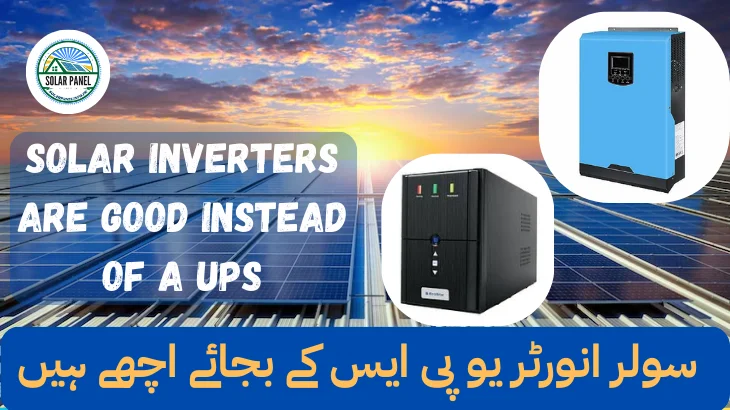Solar inverters are good instead of a UPS
In today’s environmentally aware culture, having a dependable power source is essential. Many households and businesses rely on backup systems to ensure a continuous electricity supply during power outages or voltage changes. Traditionally, Uninterruptible Power Supply (UPS) systems have served this purpose. However, as environmental concerns grow and renewable energy technology advances, solar inverters are becoming more appealing alternatives. This article explores why solar inverters could outshine UPS systems, especially in terms of long-term sustainability, cost efficiency, and performance.
Read more: Livoltek inverter price in Pakistan

آج کے ماحول سے آگاہ کلچر میں، قابل اعتماد طاقت کا ذریعہ ہونا ضروری ہے۔ بہت سے گھرانے اور کاروبار بجلی کی بندش یا وولٹیج کی تبدیلیوں کے دوران مسلسل بجلی کی فراہمی کو یقینی بنانے کے لیے بیک اپ سسٹمز پر انحصار کرتے ہیں۔ روایتی طور پر، بلاتعطل پاور سپلائی (UPS) سسٹم نے اس مقصد کو پورا کیا ہے۔ تاہم، جیسے جیسے ماحولیاتی خدشات بڑھ رہے ہیں اور قابل تجدید توانائی کی ٹیکنالوجی ترقی کر رہی ہے، سولر انورٹرز ایک زیادہ دلکش متبادل کے طور پر ابھر رہے ہیں۔ یہ مضمون ان وجوہات کی کھوج کرتا ہے جن کی وجہ سے سولر انورٹرز UPS سسٹم کو پیچھے چھوڑ سکتے ہیں، خاص طور پر طویل مدتی پائیداری، لاگت کی کارکردگی اور کارکردگی کے لحاظ سے۔
What Is a UPS?
A Uninterruptible Power Supply (UPS) is a handy device that steps in to provide backup power from its battery whenever there’s a hiccup in the main power supply. It’s great for protecting sensitive electronics like computers, servers, and medical equipment from unexpected interruptions. Inside a UPS, you’ll find an inverter, a battery, and a rectifier working together to keep things running smoothly. Just keep in mind that while it’s fantastic for short-term power support, it relies on the grid to keep its batteries charged.
What Is a Solar Inverter?
A solar inverter is a nifty device that transforms the direct current (DC) electricity produced by solar panels into alternating current (AC), which is what we use in our homes and businesses. When it’s used alongside a battery, it becomes part of a hybrid inverter system, allowing you to store any extra solar energy you generate. This is super handy for powering your home during outages or at night! With a solar inverter, you can enjoy the benefits of renewable energy while still having the option to power your entire building independently from the grid. It’s like having your little energy superhero.
Read more: NS inverter price in Pakistan 2026
Why Solar Inverters Are Better Than UPS Systems
Energy Independence and Sustainability توانائی کی آزادی اور پائیداری
UPS systems depend on grid power for charging their batteries and only provide temporary backup during outages. Once their battery is drained, they cannot function until the grid is restored. In contrast, solar inverters create their power and can recharge daily while the sun shines, leading to reduced grid dependence and a lower carbon footprint.
Long-Term Cost Efficiency طویل مدتی لاگت کی کارکردگی
Investing in a solar inverter system offers long-term savings despite a higher initial cost than regular UPS systems. Key benefits include:
- Free power from solar panels eliminates electricity costs for charging. Minimal maintenance required.
- Availability of government incentives and subsidies.
- Increased property value with solar technology.
In contrast, traditional UPS systems can lead to ongoing electricity costs due to their reliance on the grid. Overall, going solar saves money and benefits the environment.
Extended Backup Time توسیعی بیک اپ ٹائم
UPS systems provide backup power for a short duration, typically from a few minutes to a couple of hours, allowing users to safely shut down devices during outages. In contrast, solar inverter systems with battery storage can offer backup for several hours or even days, and with proper planning, they can meet daily household or office power needs indefinitely during power outages.
Environmentally Friendly ماحول دوست
UPS systems depend on electricity from fossil fuels, leading to carbon emissions and environmental harm. In contrast, solar inverters harness sunlight, a renewable source, and produce zero emissions, making them a sustainable alternative in addressing climate change.
Read more: Solar Energy & Pakistan’s Climate Goals
Scalability and Integration اسکیل ایبلٹی اور انٹیگریشن
Modern solar inverter systems are modular and can be easily scaled by adding more panels or batteries as power needs grow. In contrast, most UPS systems have a fixed capacity, requiring a complete replacement when power needs increase.
Smarter Technology ہوشیار ٹیکنالوجی
- Modern solar inverters offer functionalities such as:
- Mobile app-based remote monitoring
- Intelligent energy management
- Load prioritization options
- Real-time performance analysis
In contrast, UPS systems typically do not possess these advanced features and are restricted to fundamental battery management.
When to Choose a UPS Instead?
- While solar inverters provide a more eco-friendly long-term solution, UPS systems continue to fulfill vital roles, especially in situations where:
- The power outage persists for only a few minutes.
- An instantaneous transition is necessary without any lag (crucial for servers or medical devices).
- Setting up solar panels is unfeasible due to location, roofing structure, or local regulations.
Additional Benefits of Solar Inverters Over UPS
Power Backup + Power Generation پاور بیک اپ + پاور جنریشن
UPS provides only backup power, while solar inverters offer both backup power and electricity generation from solar panels during the day. This dual functionality makes solar inverters more economical and practical.
Reduced Dependency on Grid Power گرڈ پاور پر کم انحصار
A UPS relies on the power grid for operation and battery recharging, whereas a solar inverter produces and stores its own electricity, making it suitable for areas with frequent power cuts or off-grid situations.
Eco-Friendly Solution ماحول دوست حل
UPS systems indirectly contribute to carbon emissions due to their reliance on fossil fuel-based electricity. In contrast, solar inverters utilize clean and renewable solar energy, helping reduce carbon footprints and promoting sustainability.
Cost Comparison: UPS vs. Solar Inverter
| Feature | UPS System | Solar Inverter System |
| Initial Cost | Lower | Higher |
| Operational Cost | High (depends on grid) | Low (sunlight is free) |
| Electricity Bill | Increases | Decreases |
| Maintenance | Moderate | Low |
| Lifespan | 3-5 years | 10-15 years (with good batteries) |
| Payback Time | No return | 3–6 years (then it’s free power) |
The price variation among solar inverters with similar power ratings is due to differences in materials, software, and protective features. Premium inverters offer greater reliability, better energy conversion, and efficient battery management, making them ideal for larger systems. To maximize performance, also consider the placement of your solar panels and inverter. For more tips, read our guide on optimal inverter positioning.
Limitations of UPS That Solar Inverters Overcome
| Limitations of UPS | Solar Inverter Advantage |
| Short backup time | Long-lasting, rechargeable via sunlight |
| High electricity bills | Reduced or eliminated bills |
| No power generation | Generates its own electricity |
| Dependent on the grid | Independent or hybrid options |
| Not scalable | Easily scalable by adding panels/batteries |
| High maintenance | Low maintenance with modern systems |
Why Are Some Solar Inverters So Expensive?
You might be curious about why there is such a variation in price between solar inverters that have comparable power ratings. The explanation lies in the materials, software, and protective features included. Premium solar inverters provide enhanced reliability, improved energy conversion, and more efficient battery management. This makes them essential for larger or more intricate solar setups. To maximize the efficiency of your solar system, it’s also important to think about the placement of your solar panels and inverter. Discover more in our comprehensive guide on the ideal positioning for solar inverters.
Conclusion
In a time when sustainable living and energy efficiency are gaining importance, solar inverters present a more intelligent and environmentally friendly option compared to traditional UPS systems. While a UPS offers temporary support during power outages, a solar inverter provides an additional advantage by generating electricity, storing energy, and minimizing dependence on the electrical grid. Although the upfront costs may be higher, the long-term advantages in savings, ecological impact, and energy autonomy make solar inverters the obvious choice for innovative homeowners and businesses. For an energy solution that aligns with future needs and eco-awareness, solar inverters are the superior investment.
ایک ایسے وقت میں جب پائیدار زندگی اور توانائی کی کارکردگی کو اہمیت حاصل ہو رہی ہے، شمسی توانائی کے انورٹرز روایتی UPS سسٹمز کے مقابلے میں زیادہ ذہین اور ماحول دوست آپشن پیش کرتے ہیں۔ جب کہ UPS بجلی کی بندش کے دوران عارضی مدد فراہم کرتا ہے، ایک سولر انورٹر بجلی پیدا کرنے، توانائی کو ذخیرہ کرنے، اور بجلی کے گرڈ پر انحصار کو کم کر کے ایک اضافی فائدہ فراہم کرتا ہے۔ اگرچہ ابتدائی لاگتیں زیادہ ہوسکتی ہیں، لیکن بچت، ماحولیاتی اثرات، اور توانائی کی خود مختاری میں طویل مدتی فوائد سولر انورٹرز کو جدید گھر کے مالکان اور کاروبار کے لیے واضح انتخاب بناتے ہیں۔ توانائی کے حل کے لیے جو مستقبل کی ضروریات اور ماحول سے متعلق آگاہی سے ہم آہنگ ہو، سولر انورٹرز بہترین سرمایہ کاری ہیں۔
FAQ’s
Can a solar inverter work without batteries?
Solar inverters can operate without batteries in a grid-tied system; however, power will be lost during an outage unless a battery is included.
Is a solar inverter worth the higher cost compared to a UPS?
Certainly. While the initial cost is higher, solar inverters ultimately save money by lowering electricity bills and requiring less maintenance.
Can I use a solar inverter in an apartment or rented space?
Whether compact solar systems or portable solar generators are feasible alternatives depends on space availability and building regulations.


